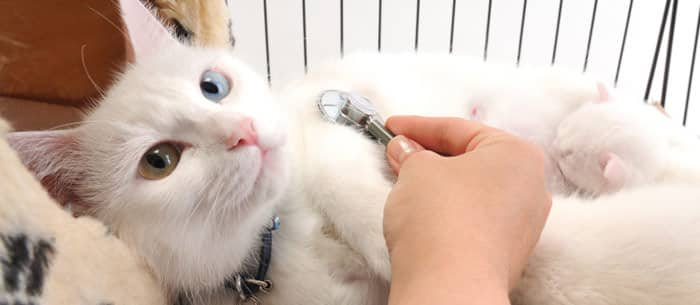Many cat lovers are unaware that cats can get heartworm disease, a condition that is usually associated with dogs. Care.com recently asked Dr. Gregg Rapoport, DVM, DACVIM, staff cardiologist at Angell Animal Medical Center in Boston, about heartworm disease in cats.
Care.com: What exactly is heartworm disease, and is it contagious?
Dr. Rapoport: As the name suggests, heartworm disease is an infection caused by an actual worm. The worm’s scientific name is Dirofilaria immitis. It is in a category of worms called “filarial” worms, and these are members of the larger group of “roundworms.” Heartworm disease is not contagious between animals. Mosquitoes are required for transmission of the heartworm from one susceptible host to the next. Heartworm disease, therefore, requires conditions where mosquitoes can survive. There are also specific temperature requirements in order for successful worm development to occur.
Care.com: Most pet lovers are aware that dogs can get heartworm disease, but many people don’t know that cats can get it, too. Is this really the case, and if so, what is the prevalence of heartworm disease in cats?
Dr. Rapoport: It is true that cats can acquire heartworm disease. It is typically stated that, in any given area of the country, the prevalence of heartworm disease in cats is between 5 and 15 percent of canine prevalence. The actual prevalence depends on the specific region.
Care.com: Is the problem restricted to particular geographical regions, and are only outdoor cats at risk?
Dr. Rapoport: Heartworm disease has been reported in every state in this country, but there is significant geographical variation regarding numbers of new cases reported each year. Incidence is highest, by far, in the southeastern U.S., and higher in the eastern half of the country in general compared to the western half. Although indoor-only cats are certainly at lower risk of infection than cats that go outside, they are not completely protected and can still acquire heartworm disease. In fact, one study reported that approximately one quarter of cats diagnosed with heartworm disease were considered to be indoor-only cats.
Care.com: Can a cat catch heartworm disease from a dog?
Dr. Rapoport: Due to the required life cycle partially described above, heartworm disease cannot be spread directly from a dog to a cat (or vice versa or between members of the same species). Instead, as the main and preferred host for the heartworm, the dog serves as a reservoir for the worm. The mosquito, having acquired the earliest larval stage of the worm 10 to 14 days ago, delivers the infective stage of the worm to the cat (or another dog, or even the same dog).
Care.com: What are the symptoms of heartworm disease in cats?
Dr. Rapoport: There are many possible symptoms of heartworm disease, none of which are specific to this condition. These include (but are not limited to) coughing, difficulty breathing, vomiting, lethargy, weakness, weight loss, and, rarely, sudden death.
Care.com: Is it treatable once a cat is infected?
Dr. Rapoport: The medication used to kill heartworms and treat heartworm disease in dogs is, unfortunately, toxic to cats and so is not used for feline heartworm disease. Depending on the presence and severity of symptoms, steroids such as prednisone are sometimes used to control inflammation in the lungs. In severe cases, more intensive care — including hospitalization and oxygen supplementation — may be necessary. Ultimately, it is up to the cat’s immune system to “clean up” the heartworms when they die. Heartworms tend to live for an average of two to three years in cats (vs. five to seven years in dogs), so the disease is eventually self-limiting if the cat can successfully deal with the worms.
Care.com: Is there any way to prevent a cat from getting heartworm disease?
Dr. Rapoport: There are a few different medications that are all very safe and effective in preventing heartworm disease in both cats and dogs. Owners should consult with their cat’s veterinarian in deciding which one to use.
Care.com: Should people who live with cats, then, be as worried about heartworm disease as people who live with dogs?
Dr. Rapoport: People with cats should simply be aware that there is some risk of heartworm disease (degree of risk depending on the region of the country), that this condition can be severe and even life threatening, and that there are options for prevention as mentioned above.
Care.com: What is the best way to decide if your cat should be protected against heartworm disease?
Dr. Rapoport: The need for heartworm prophylaxis in cats depends on the region of the country, and there is not uniform agreement as to which cats should routinely receive such medication. It seems reasonable that for any cat living in a region where heartworm disease is endemic in dogs, and especially for those cats which go outside at all, use of heartworm prophylaxis is the most prudent course. Given the excellent safety profile of these medications (which also have utility against other parasites), along with the potentially dire consequences of heartworm disease, one could argue for the use of heartworm prophylaxis even in indoor-only cats within endemic areas. Owners of cats should discuss this with their cat’s veterinarian.
Care.com: Can human beings get heartworm disease?
Dr. Rapoport: Heartworm disease in people is possible and is transmitted by the mosquito as for cats and dogs, however it is fortunately extremely rare.
Care.com: Is there a source of information about heartworm disease in cats that people can turn to?
Dr. Rapoport: There is an organization called the American Heartworm Society which maintains a very informative and user-friendly website: heartwormsociety.org.
If you’re worried about heartworm disease, or even if you’re unsure whether or not to be concerned, talk to your veterinarian. He or she can advise you about medication that will protect your cat. It’s always a good idea to be informed so that you can make the best decision for you and your beloved pet.
Faye Rapoport DesPres writes about pet care issues for Care.com and other publications. She has five cats and a website at ourplacetopaws.com.


